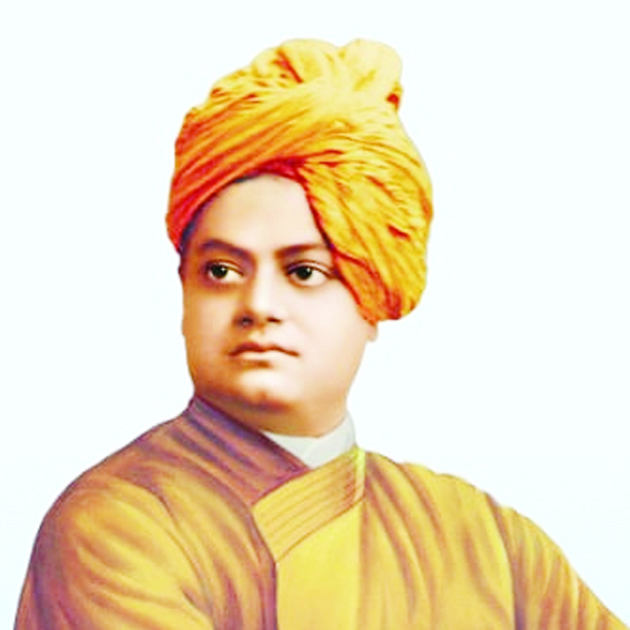Milind Kumar Shukla
Swami Vivekananda, born as Narendra Nath Datta in the Bengali Hindu family of Vishwanath Datta and Bhuvaneshwari Devi on January 12, 1863, was a luminary of the 19th and 20th centuries, and a key figure in the revival of Hind Dharma and the spread of Vedanta philosophy in the West. He is often hailed as the “patriot saint of modern India” and remains an enduring source of inspiration for millions around the world.
Early Life and Spiritual Quest
Swami Vivekananda was born into a Bengali Hindu family in Kolkata, India. From an early age, he displayed a deep intellectual curiosity and a fervent interest in spirituality. His inquisitiveness led him to explore various religious and philosophical traditions. However, it was his encounter with the revered saint, Sri Ramakrishna Paramahansa, that proved to be the turning point in his life.
Under the guidance of Sri Ramakrishna, young Narendra underwent intense spiritual training and developed a profound understanding of the essence of Sanatan Dharma, or the eternal way of life. He absorbed the teachings of Vedanta, the Upanishads, and the Bhagavad Gita, and began to perceive the underlying unity of all religions.
The Parliament of Religions in Chicago
One of the most momentous events in Swami Vivekananda’s life was his historic address at the Parliament of Religions in Chicago in 1893. Representing India and Hinduism, he began his speech with the words, “Sisters and brothers of America,” which immediately captivated the audience and established a connection that transcended geographical and cultural boundaries.
Swami Vivekananda’s speech not only introduced greatness of Hinduism to the Western world but also conveyed the essence of universal brotherhood, tolerance, and the idea of a harmonious coexistence of diverse faiths. His message of religious pluralism, tolerance, and acceptance of all paths to the Divine left an indelible mark on the hearts and minds of those present.
Meeting with Ramakrishna Paramahansa:
In his quest for spiritual understanding, Vivekananda encountered the renowned saint Ramakrishna Paramahansa. Under Ramakrishna’s guidance, he underwent profound spiritual experiences and developed a deep understanding of dharma. Ramakrishna’s teachings left an indelible mark on Vivekananda’s philosophy, shaping his later mission to promote the spiritual unity of humanity.
The Essence of Sanatan
Swami Vivekananda’s teachings emphasized the universality of religion and the unity of all beings. He propounded that the core principles of Sanatan Dharma are based on the recognition of the divinity inherent in every individual. His philosophy sought to transcend the boundaries of caste, creed, and religion, advocating the realization of one’s own divine nature.
He believed that the pursuit of knowledge, selfless service, and the practice of meditation were fundamental to realizing the true nature of the self. Swami Vivekananda’s message was not confined to any sect or religion, but rather offered a universal pathway to spiritual enlightenment and related to Dharma.
Legacy and Continuing Influence
Swami Vivekananda’s impact on India’s cultural and spiritual landscape is immeasurable. He founded the Ramakrishna Mission and Math, organizations dedicated to the service of humanity, irrespective of caste, creed, or religion. The mission’s work in education, healthcare, and relief services continues to touch countless lives.
His teachings continue to resonate worldwide, influencing thinkers, leaders, and spiritual seekers. His legacy has also inspired numerous individuals to embark on their own journeys of self-discovery and spiritual awakening.
Conclusion
Swami Vivekananda, the radiant torchbearer of Sanatan Dharma, illuminated the world with his profound wisdom, universal love, and unwavering commitment to the betterment of humanity. His teachings remain a beacon of hope and a source of strength for all those who seek a deeper understanding of the eternal truths that bind us all.
In the words of Swami Vivekananda, “Arise, awake, and stop not till the goal is reached.” His call to action resonates through the ages, urging us to realize our highest potential and work towards the upliftment of not only ourselves but all of humanity. Swami Vivekananda’s impact extends far beyond his lifetime. His teachings continue to inspire millions worldwide, and the Ramakrishna Mission remains actively involved in humanitarian and educational activities. Vivekananda’s call for the harmony of religions, tolerance, and the recognition of the divinity within everyone remains relevant in the modern world. His life and work serve as a guiding light for those seeking a balance between spiritual values and the challenges of contemporary life.
(The author is an Engineering Student, SMVD University, Katra, J&K)
Trending Now
E-Paper


